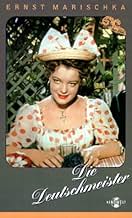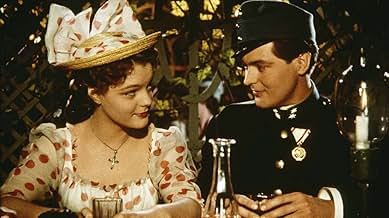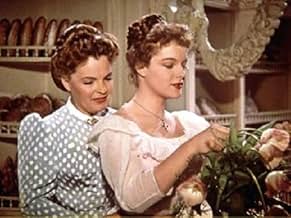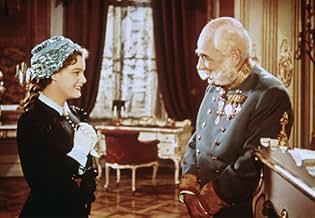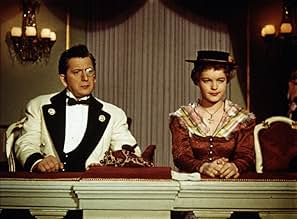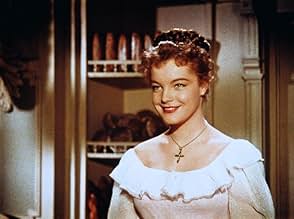Die junge Stanzi besucht Wien und hilft dort einem jungen Korporal und Musiker mit dessen Marschlied "Die Deutschmeister" berühmt zu werden.Die junge Stanzi besucht Wien und hilft dort einem jungen Korporal und Musiker mit dessen Marschlied "Die Deutschmeister" berühmt zu werden.Die junge Stanzi besucht Wien und hilft dort einem jungen Korporal und Musiker mit dessen Marschlied "Die Deutschmeister" berühmt zu werden.
Siegfried Breuer Jr.
- Korporal Wilhelm August ('Willy') Jurek
- (as Siegfried Breuer jun.)
Handlung
WUSSTEST DU SCHON:
- VerbindungenRemake of Frühjahrsparade (1934)
- SoundtracksMir ist's gleich
Music by Robert Stolz
Lyrics by Ernst Marischka
Performed by Hans Moser and Magda Schneider
Ausgewählte Rezension
3.9 stars from IMDB users? For shame! I give this film 10 out of 10, and no mistake.
Anyone who doesn't realise this is the ne plus ultra of Heimat films -- with the exception of the Sissi trilogy, another Ernst Marischka Agfacolor bonbon -- doesn't know a thing about cinema, and less about Viennese Burgtheater history.
"Die Deutschmeister" showcases the most talented actors who ever pried a laugh from the hyper-critical Viennese (certainly the most discerning judges of acting talent in all of Europe), a mouthwatering Who's Who of Austrian theatre and film: Susi Nicoletti, Gunther Philipp, Adrienne Gessner, Hans Moser, Josef Meinrad, Paul Hörbiger not to mention Romy Schneider's film debut alongside mama Magda.
This film has not made it to the English-speaking world, and more's the pity -- certainly those in Spain, Portugal, Italy, France, South America are not so deprived. It's to the great credit of the translators involved that the pace and hilarity are not compromised in the least, the Portuguese and Castillian-Spanish versions as special standouts. The Viennese accent and slang does not lend itself to translation, partly because of the inherently comedic nature of the accent with it's broad A's and slurred rat-tat-tat speech, but perhaps that's more a credit of the comedic richness of the film, which allows itself to be replicated with a sparkling levity in whatever language.
For those who wish a film capsule, here you are:
Stanzi Hübner, the insouciant be-dirndled Salzburger maiden who believes in fortunes foretold by parrots, comes to the "Kaiserstadt", Vienna, to work for her auntie Therese. She in turn is the Official Croissant Baker of that aged Biedermeier legend, the Emperor Franz Josef: a job of importance in this croissant-conscious capital. Now there's a mouthful.
In one of the twists of fate so adored and duplicated a million-fold by Austrian storytellers, she is confused by a Tourette's Syndromed nobleman as a Countess in a Fasching dance, and he later enters into matrimony sight unseen with a real Countess, who merely had the infinite good fortune of living in the general neighbourhood of Stanzi's aunt.
Stanzi then meets a young would-be composer soldier in Die Deutschmeister regiment, and whilst her own romance is flourishing, she engineers her aunt's flirtation with a courtier whose sole duty seems to be "Official Picker-Upper of the Daily Imperial Croissant". No doubt his title is more grandiose on paper.
For those who wish a highlighted critique, here it is:
Watch the light interplay between Susi Nicoletti, Adrienne Gessner, and Gunther Philipp and then tell us this film isn't worthy of Tracy and Hepburn at their peak. Only when you've acted together more times than they have, do you mistake absolute mastery of their craft for anything less than what it is.
If you want a frisky gambol in the best tradition of Viennese light comedy, this my friends, is your film.
Anyone who doesn't realise this is the ne plus ultra of Heimat films -- with the exception of the Sissi trilogy, another Ernst Marischka Agfacolor bonbon -- doesn't know a thing about cinema, and less about Viennese Burgtheater history.
"Die Deutschmeister" showcases the most talented actors who ever pried a laugh from the hyper-critical Viennese (certainly the most discerning judges of acting talent in all of Europe), a mouthwatering Who's Who of Austrian theatre and film: Susi Nicoletti, Gunther Philipp, Adrienne Gessner, Hans Moser, Josef Meinrad, Paul Hörbiger not to mention Romy Schneider's film debut alongside mama Magda.
This film has not made it to the English-speaking world, and more's the pity -- certainly those in Spain, Portugal, Italy, France, South America are not so deprived. It's to the great credit of the translators involved that the pace and hilarity are not compromised in the least, the Portuguese and Castillian-Spanish versions as special standouts. The Viennese accent and slang does not lend itself to translation, partly because of the inherently comedic nature of the accent with it's broad A's and slurred rat-tat-tat speech, but perhaps that's more a credit of the comedic richness of the film, which allows itself to be replicated with a sparkling levity in whatever language.
For those who wish a film capsule, here you are:
Stanzi Hübner, the insouciant be-dirndled Salzburger maiden who believes in fortunes foretold by parrots, comes to the "Kaiserstadt", Vienna, to work for her auntie Therese. She in turn is the Official Croissant Baker of that aged Biedermeier legend, the Emperor Franz Josef: a job of importance in this croissant-conscious capital. Now there's a mouthful.
In one of the twists of fate so adored and duplicated a million-fold by Austrian storytellers, she is confused by a Tourette's Syndromed nobleman as a Countess in a Fasching dance, and he later enters into matrimony sight unseen with a real Countess, who merely had the infinite good fortune of living in the general neighbourhood of Stanzi's aunt.
Stanzi then meets a young would-be composer soldier in Die Deutschmeister regiment, and whilst her own romance is flourishing, she engineers her aunt's flirtation with a courtier whose sole duty seems to be "Official Picker-Upper of the Daily Imperial Croissant". No doubt his title is more grandiose on paper.
For those who wish a highlighted critique, here it is:
Watch the light interplay between Susi Nicoletti, Adrienne Gessner, and Gunther Philipp and then tell us this film isn't worthy of Tracy and Hepburn at their peak. Only when you've acted together more times than they have, do you mistake absolute mastery of their craft for anything less than what it is.
If you want a frisky gambol in the best tradition of Viennese light comedy, this my friends, is your film.
Top-Auswahl
Melde dich zum Bewerten an und greife auf die Watchlist für personalisierte Empfehlungen zu.
- How long is Die Deutschmeister?Powered by Alexa
Details
- Laufzeit1 Stunde 46 Minuten
- Sound-Mix
- Seitenverhältnis
- 1.37 : 1
Zu dieser Seite beitragen
Bearbeitung vorschlagen oder fehlenden Inhalt hinzufügen

Oberste Lücke
By what name was Die Deutschmeister (1955) officially released in Canada in English?
Antwort

